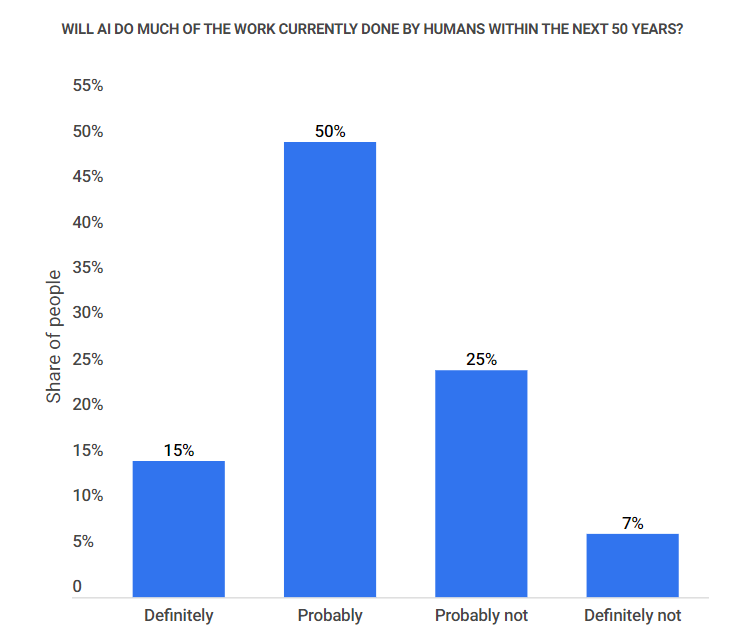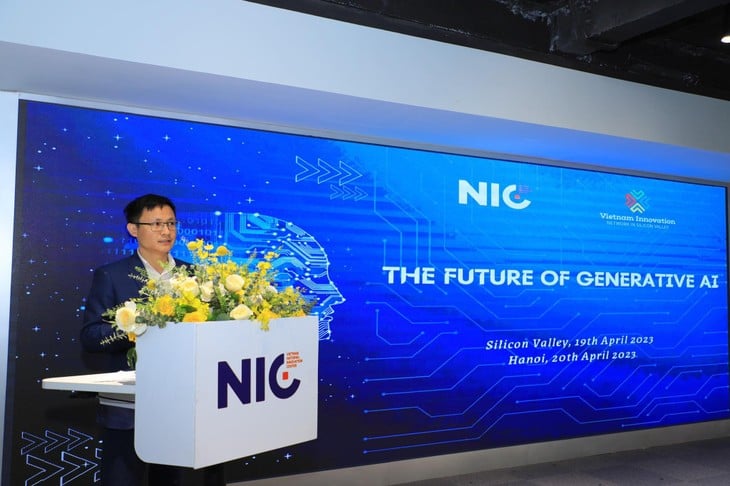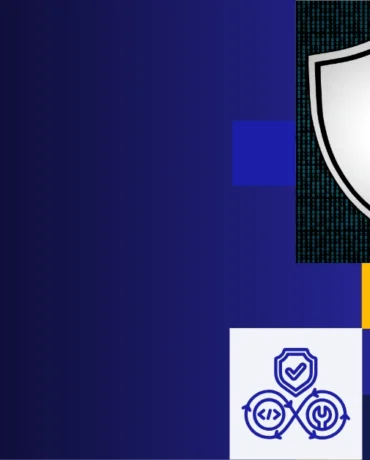Even though Artificial Intelligence (AI) is rapidly transforming industries worldwide, AI adoption in Vietnam still has a lot of room for improvement. Only 27% of organisations in Vietnam are fully prepared to deploy and leverage Artificial Intelligence (AI)-powered technologies, highlighting AI impact on job market
As AI continues to advance, it has the potential to disrupt the IT job market in Vietnam. The public and private sectors, encouraged by governmental support, are increasingly updating their protocols to be more AI-friendly.
The surging transformation with AI at the front will bring both challenges and opportunities for the IT industry. The AI impact on job market will be significant, so what does this mean for IT professionals and businesses in Vietnam?
Read on to find out more!
Understanding AI Impact on Job Market
With the right AI tools, businesses can significantly cut down on costs. For example, software providers can use DeepCode to help developers debug more easily.
AI’s ability to automate tasks acts as a double-edged sword for the IT industry, however. While it enhances efficiency and productivity, it also poses a threat to repetitive IT jobs.
Up to 40% of IT jobs in Vietnam are at risk of automation by 2030. This statistic highlights the potential for job losses and workforce downsizing in specific IT sectors. But what does this mean? Even though some traditional roles might diminish, there is an urgent need for the workforce to pivot and adapt to new realities.

Source: Investguiding
New Opportunities with AI: What’s Lying Ahead?
Despite the fear of job losses, AI is also paving the way for new job roles related to its development and implementation.
The Vietnamese Ministry of Information and Communications predicts that the ICT market will grow past 17 billion USD in 2027. The increasing demand for AI engineers, data scientists, machine learning specialists, AI ethicists, and security specialists in Vietnamese IT companies is a testament to this.
Beyond being mere job titles, these roles shift towards a more complex and innovative IT landscape. There are more and more tremendous opportunities to pivot and grow, with workers and business owners continuing to use AI to drive innovation and career advancement.
The Evolving Skillset Landscape
Stagnation is not a word in the AI era. New roles being created mean that IT professionals must adapt and acquire new skills to stay relevant.
Essential skills for the future of Vietnam’s IT workforce include data analysis and interpretation, proficiency in programming languages for AI development, and machine learning and deep learning expertise.
A competent hire should also have a comprehensive understanding of AI ethics and responsible development. With demands surging, Vietnamese universities are increasingly pushing AI programs to prepare young people for the changing landscape. The Vietnamese government also shows supportive signs towards this transition by heavily investing in the sector.

This proactive approach is crucial, but how can organizations support this transition? Turns out, continuous learning and development is key.
What Jobs will AI NOT Replace?
According to Upwork, while AI continues to advance rapidly and automate many routine tasks, numerous jobs remain highly resistant to replacement due to their reliance on uniquely human qualities like emotional intelligence, creativity, complex decision-making, and interpersonal skills.
Healthcare and Medical Professions
Healthcare jobs represent one of the most AI-resistant sectors because they require human empathy, complex decision-making, and personalized care that machines cannot replicate. Nurses and nurse practitioners are particularly secure, with nurse practitioners projected to grow by 45.7% by 2032, the highest growth rate among AI-proof jobs. Other protected healthcare roles include:
- Doctors and specialists like psychiatrists, therapists, and ob-gyns
- Physical therapists and occupational therapists
- Mental health counselors (projected 22.1% growth)
- Pharmacists and veterinarians
- Medical and health services managers (93 AI resistance score)
These positions require not just technical knowledge but also the ability to provide bedside care, emotional support, and make nuanced medical decisions in unpredictable situations.
Creative and Artistic Fields
Jobs requiring creativity and original thinking remain largely protected from AI automation. While AI can generate content, it lacks the human imagination, emotional depth, and cultural understanding needed for truly innovative work. Protected creative roles include:
- Artists, designers, and musicians
- Writers and journalists who craft compelling narratives
- Choreographers (projected 29.7% growth by 2032)
- Marketing strategists who connect emotionally with audiences
Education and Training
Teaching and educational roles are AI-resistant because they require human connection, adaptability, and the ability to inspire and motivate students. Key positions include:
- Teachers and instructors at all levels
- School administrators
- Training and development specialists (61 AI resistance score)
- Nursing instructors (projected 21.5% growth)
Legal and Professional Services
Lawyers top the list with a perfect 100 AI resistance score because legal work demands human judgment, ethical reasoning, and interpretation of complex laws. The legal profession requires skills that AI cannot replicate, including nuanced argumentation and understanding of gray areas in law.
Skilled Trades and Manual Labor
Jobs requiring manual dexterity and physical problem-solving remain highly secure from AI replacement. These include:
- Electricians and elevator technicians
- Pipe fitters and linemen
- Roofers and construction workers
- Massage therapists and hair stylists
Current AI technologies are not advanced enough to handle intensive manual work that requires adaptability to unpredictable physical environments.
Management and Leadership Roles
Leadership positions requiring human judgment and interpersonal skills are well-protected:
- Human resources managers (87 AI resistance score)
- General and operations managers (75 AI resistance score)
- First-line supervisors (64 AI resistance score)
Personal Services
Service jobs that rely on human touch and personal interaction remain AI-resistant:
- Personal trainers and coaches (projected 20% growth)
- Athletic trainers (17.5% growth)
- Hairdressers and cosmetologists
- Tattoo artists and manicurists
Specialized Technical Fields
According to Bill Gates, three specific technical fields remain particularly AI-resistant:
- Coders and programmers – AI still needs human oversight for complex architecture and creative problem-solving
- Energy experts – Managing power grids involves too much risk for full automation
- Biologists – Scientific discovery requires creativity that AI lacks
Sales and Client Relations
Sales professionals and account managers remain protected because closing deals requires relationship-building, understanding client needs, and human rapport that AI cannot replicate. The personal connection and trust-building aspects of sales are fundamentally human skills.
The common thread among all these AI-resistant jobs is their reliance on skills that remain uniquely human: emotional intelligence, creativity, complex problem-solving, manual dexterity, and the ability to build meaningful relationships. While AI will continue to serve as a powerful tool to assist these professionals, it cannot fully replace the human elements that make these roles essential.
Education and Training Initiatives to Adopt in 2025
To meet this demand for new skills, educational institutions and companies play a crucial role in upskilling the workforce.
Initiatives such as AI training programs and certifications, collaboration between universities and tech companies, and government support for workforce development are vital. For instance, the Vietnamese government’s National Program on Digital Transformation by 2025 aims to provide AI training for over 100,000 IT professionals.
Why should businesses invest in these training initiatives? Because an empowered, well-trained workforce is the backbone of innovation and competitive advantage in the AI era.
AI Growth at Sunbytes, for Sunbytes People
At Sunbytes, we understand the importance of adapting to the changing job market. That’s why we are constantly adopting solutions and training services to help IT professionals navigate this transformation.
Concurrent with the grand opening of our office, we hosted AI workshops for both the technical and non-technical teams to decipher the state of AI. Sunbytes also successfully organized our AI Hackathon for 5 competing teams to live and breathe AI developments.
AI skills training programs and career development are necessary for your team to thrive. By partnering with Sunbytes, we will fully equip your teams with the best-matching candidates to fast-track AI and IT development.
Final Words
AI impact on job market is undeniable, but it is not necessarily a bleak prospect. While some jobs may become obsolete, new ones will emerge to take their place.
The future holds great potential for growth in the AI-powered IT sector, and Vietnam is well-positioned to ride this wave of technological advancement. The key lies in continuous learning and skill development for IT professionals to adapt and thrive, which Sunytes can help with.
At Sunbytes, we offer a range of services to help businesses leverage AI technology effectively. From AI development to digital transformation consulting, our team is ready to help you grow with AI in the next business chapters. Contact us today to start!


